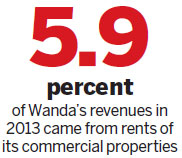Commercial property glut sparks concern
Updated: 2014-12-20 07:30
By Cheng Yingqi(HK Edition)
|
|||||||
An excessive supply of commercial properties on the mainland has sparked concern over fierce competition, including the challenge from foreign retail giants.
And, experts suggest that upgrading the industry may be the only way out.

The scenario emerges as Dalian Wanda Commercial Properties Co Ltd - the mainland's biggest developer of shopping centers - gears up for its debut on the Hong Kong Stock Exchange on Dec 23.
The company - the property development arm of mainland real estate giant Dalian Wanda Group - aims to raise HK$28.8 billion ($3.7 billion) in Hong Kong in the largest initial public offering (IPO) listing in Asia this year.
"With the growing number of shopping malls coming on stream, coupled with the rapid growth of e-commerce, the risk of oversupply in commercial properties mounts," Liu Yuan, chief research officer with brokerage firm Centaline Group, said in an article published on the Chinese-language website of the Financial Times.
Shopping centers in seven of the mainland's biggest cities - Beijing, Shanghai, Guangzhou, Shenzhen, Chongqing, Chengdu and Wuhan - have grown at a frantic pace, with more new shopping malls being built.
At the present speed of construction, the per-person area in these cities will be 0.5 square meters by next year, Liu said, compared with an average shopping area of only 0.4 square meters per person in the US. A recent survey conducted by the Corporate Research Center of INSITE Asset Management Group among 20 major mainland cities showed a similar trend. The total area of high-end commercial properties had reached 71 million square meters in the third quarter of this year, and new supply is expected to exceed 33 million square meters by 2017.

"Since retail needs are not likely to bounce back shortly, commercial property developers will face fierce competition in future," Liu warned.
Six Wal-Mart stores in Hefei, capital city of Anhui province, had closed in the past two years in the face of intense competition. In Yinchuan, capital city of Ningxia Hui Autonomous Region, a surplus supply of office buildings has led to a fall in rents.
Industry insiders have blamed the government's series of restrictive policies to curb real estate prices since 2010 for property developers flocking to the commercial sector.
"Many developers were forced to develop commercial properties because when they tried to acquire land from local governments, they had to assure the authorities that they would promote employment, increase taxes and boost consumption," said Huang Suiran, assistant executive director of the Shenzhen branch of property services firm DTZ.
In the case of Wanda, rents from its commercial properties accounted for only 5.9 percent of its revenues last year, according to data released by commercial property services firm RET.
"For Wanda, the contribution from rents was relatively low because the company had already sold most of its commercial properties," explained Xu Hao, a fund manager at Guo Tai Asset Management.
"Compared with smaller builders, Wanda has been less affected by the oversupply of commercial properties. But, apparently, the company has adopted strategic changes to cope with the sluggish market," he said.
In July this year, the China Securities Regulatory Commission terminated the IPO application of Dalian Wanda Commercial Properties saying it had failed to submit relevant certification documents.
On Aug 23, Dalian Wanda Group signed a strategic agreement with Internet giant Tencent Holdings Ltd, and search engine Baidu Inc. On Sept 16, Dalian Wanda Commercial Properties submitted its IPO application documents to the Hong Kong Stock Exchange.
The company updated its prospectus on Dec 7, just one day before its roadshow, by adding contents about a newly established e-commerce company co-founded by Dalian Wanda Group, Tencent and Baidu. "The serial movement reflects Wanda's changing strategy," Xu said.

"For a company with such abundant financial resources and experience, it seems more likely they had dropped their plan to list on the A-share market deliberately to move to the Hong Kong bourse. With the company's commercial property unit listed in Hong Kong, it will be more convenient for Wanda's global asset allocation," he said.
Zhang Ping, general manager of Corporate Research Centre of INSITE Asset Management Group, said: "On the other hand, the valuations for realty companies have stayed at a relatively low level in the A-share market compared with Hong Kong. This is disadvantageous to Wanda."
The most interesting changes in Wanda's post-IPO strategy, according to experts, should be the combination of e-commerce and real estate.
"For commercial properties, the O2O (online to offline) business model will evidently increase efficiency in buying and selling, which definitely represents a future trend," Zhang said.
With a relatively stable consumption level and growing competition, more and more mainland developers are seeking opportunities from O2O business models. Since August, China Vanke Co Ltd has been cooperating with Taobao in home sales.
chengyingqi@chinadaily.com.cn
(HK Edition 12/20/2014 page6)